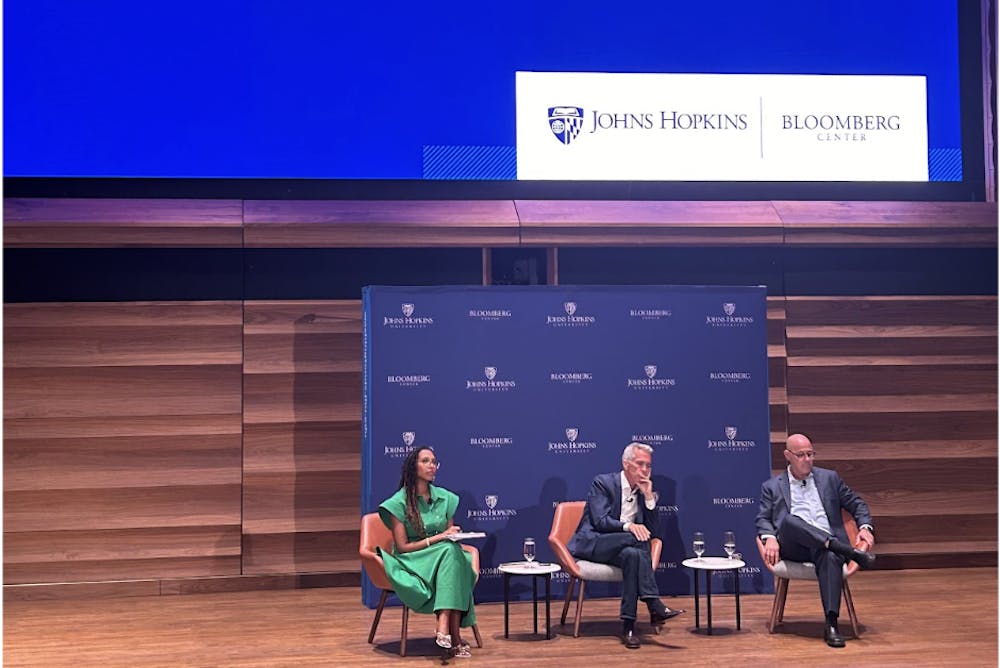On Thursday, Sept. 12, the Stavros Niarchos Foundation (SNF) Agora Institute and the Johns Hopkins University Bloomberg Center at 555 Pennsylvania Avenue hosted former congressman and gun rights proponent Joe Walsh and gun safety advocate Fred Guttenberg on their tour, “Bridging the Political Divide: Two Dads Defending Democracy.”
Walsh, a former Republican congressman from Illinois known for his Tea Party affiliations, and Guttenberg, an advocate who lost his daughter, Jamie, in the 2018 Parkland shooting, discussed how they have navigated their starkly opposing views. Moderated by Leah Wright Rigueur, associate professor of history at the SNF Agora Institute, the event explored the speakers’ evolving perspectives and their broader implications for American democracy.
Initially, Walsh and Guttenberg’s interactions were heated exchanges about the constitutionality of gun safety laws on social media. The turning point in their relationship came when Walsh reached out to Guttenberg with a tweet acknowledging their differences but expressing respect for his dedication. Guttenberg reflected on this moment during the event.
"One day, this jerk tweets at me and says, ‘you know, I disagree with almost everything you want to do, but I respect the hell out of what you’re trying to do.’ And, all of a sudden, I couldn’t be angry at him anymore,” Guttenberg said.
This gesture of mutual respect shifted the dynamics of their interactions. Walsh shared a similar sentiment.
“I got tired of fighting,” he said. “I got tired of being someone who helped us get so divided. I want to be part of the solution instead of the problem.”
The conversation underscored the importance of understanding and respecting opposing viewpoints. Students in attendance resonated with this idea while also challenging its applicability. Hayden Cheng, a freshman studying Public Health and Psychology, reflected on how respect can be a complicated concept in political discourse in an interview with The News-Letter.
“If someone has a direct conflict with my right to exist, I do think that’s an inherently disrespectful opinion, and, as such, should not be treated with respect,” Cheng noted. “However, this event reminded me of approaching discourse with leniency and reminded me of what values I want to take into the conversation.”
Arham Alam, a senior majoring in Molecular and Cellular Biology, also challenged the scope of respectful engagement in an interview with The News-Letter. He specifically highlighted the difficulty of having a productive dialogue with the other side when it comes to contentious issues such as voter suppression.
“How do you not hate people that are actively infringing on your right to vote? I think it’s incredibly important to call out B.S., and I think [Walsh and Guttenberg] could have called that out before,” he said. “[But] it’s important to have an open dialogue that is rooted in curiosity and respect.”
The speakers then addressed the current state of American democracy and the pressing need for political engagement, propelling voting as a means of exterminating unrepresentative ideals. Walsh highlighted the current incentives for politicians to adopt extreme partisan positions on political issues as a factor that he believes contributes to the nation’s deepening divide.
Cheng’s thoughts extended to the broader implications of political engagement in light of these comments.
“I do think [voting] is necessary, but I don’t think it’s the whole solution. We need to consider not only polarization as a factor but also how much people actually care about politics. I went to a Title I high school, where most people couldn’t afford to care about politics,” Cheng said.
The difficulties faced by Walsh and Guttenberg in maintaining their commitment to dialogue despite criticism from their respective communities also drove the discussion. Walsh revealed how his supporters felt betrayed by his discussions with gun safety advocates like Guttenberg. But despite the backlash, both men remain resolute in their mission.
Stephen Ruckman, managing director at the SNF Agora Institute, explained the significance of the event in an email to The News-Letter.
“SNF Agora is always in search of opportunities to showcase dialogues across diverse perspectives, so when we learned about Joe Walsh and Fred Guttenberg’s story, we wanted to share it with the Hopkins and wider communities,” he said. “Joe and Fred’s journey illustrates that it’s worth taking the time to have conversations that enable you to see the other’s perspective and find your shared humanity.”
As the event concluded, the speakers and organizers reiterated the importance of respectful dialogue among those with differing perspectives, with the hope that such conversations can foster a more united and democratic society. Guttenberg expressed a desire for educational institutions in particular to incorporate more respectful discourse.
“I hope universities and high schools embed in their curriculum more conversation and education on teaching people to talk to one another,” he said.





